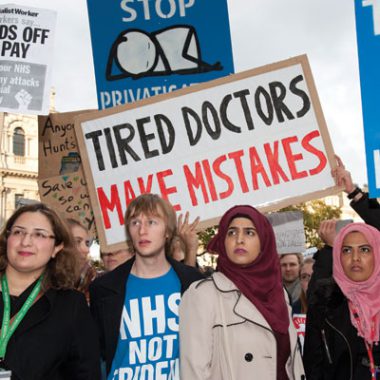Junior doctor strike set to go ahead next Tuesday after talks ‘break down’

Junior doctors in England are set to take to industrial action on Tuesday next week, after talks between the BMA and NHS Employers failed to produce an agreement, the BMA has announced.
The BMA suspended strike action over the junior doctors contract in December just a day before it was due to go ahead, after reaching an agreement with NHS Employers and the Department of Health to enter ’direct and meaningful’ negotiations.
The BMA said that the Government had failed to address junior doctors’ concerns about ‘contractual safeguards on safe working, and proper recognition for those working unsocial hours’.
Negotiations will continue in the hope of averting industrial action, but failing this only junior doctors with a role in emergency care will be working between 8am on Tuesday to 8am Wednesday next week.
If negotiations remain in a deadlock there will be a further emergency care-only walk-out – this time for 48 hours – between 26 January and 28 January and a full withdrawal of labour, including emergency care, between 8am and 5pm on 10 February.
BMA chair Dr Mark Porter said: ’Throughout this process the BMA has been clear that it wants to reach agreement on a contract that is good for patients, junior doctors and the NHS. This is why, despite overwhelming support for industrial action, the BMA instead sought conciliation talks with the Government, talks which were initially rejected and delayed by Jeremy Hunt.
’After weeks of further negotiations, it is clear that the Government is still not taking junior doctors’ concerns seriously. Furthermore, the Government has repeatedly dragged its feet throughout this process, initially rejecting our offer of talks and failing to make significant movement during negotiations.
’We sincerely regret the disruption that industrial action will cause, but junior doctors have been left with no option. It is because the Government’s proposals would be bad for patient care as well as junior doctors in the long-term that we are taking this stand.’
The dispute arose over an overhaul of junior doctors contract which is seeking to redefine Saturdays and evenings from 10am to 10 pm as ‘sociable hours’ in a bid to force hospitals to rota more doctors at weekends by removing unsociable hours payments.
The BMA says the move would lead to junior doctors working unsafe hours that could harm them and patients. The Government has disputed these claims, as well as a suggestion that changes could lead to a pay cut of as much as one third.
Health secretary Jeremy Hunt said: ’Our absolute priority is patient safety and making sure that the NHS delivers high-quality care seven days a week – and we know that’s what doctors want too, so it is extremely disappointing that the BMA have chosen to take industrial action which helps no one.
’We had made good progress in talks, resolving 15 of the 16 issues put forward by the union – everything apart from weekend pay. We have now asked ACAS to reconvene talks in the hope the BMA will return to sensible negotiations.’
But Labour’s shadow health secretary Heidi Alexander said that the health secretary’s handling of negotiations had ’been complete and utter shambles’, with junior doctors ‘left feeling demoralised and offended by comments made by ministers which suggest they don’t already work seven days a week’.
She said: ‘[T]he Government needs to go back to the drawing board and come up with proposals that are fair to junior doctors and safe for patients. This deadlock cannot be allowed to go on.’
Pulse July survey
Take our July 2025 survey to potentially win £1.000 worth of tokens












